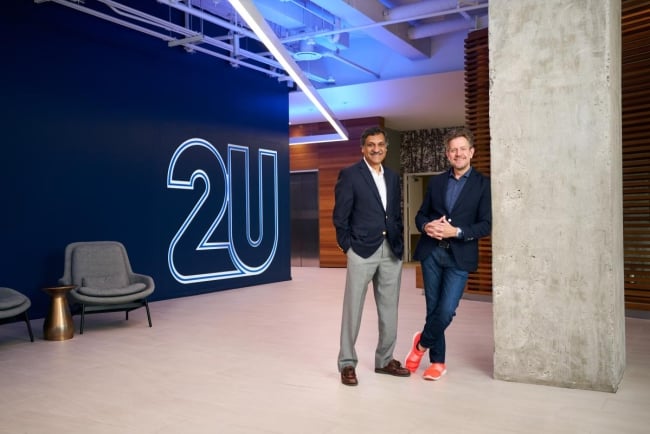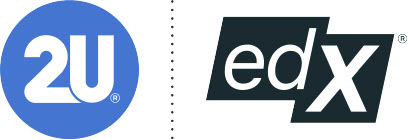You have /5 articles left.
Sign up for a free account or log in.

EdX founder Anant Agarwal, left, and 2U co-founder Chip Paucek.
2U
Months after Harvard University and the Massachusetts Institute of Technology stunned the education-technology world by announcing they would sell the nonprofit online platform they created to a technology giant, the merger of the two entities, 2U and edX, became final today.
Leaders of the two companies said the combination would offer a huge range of educational opportunities and become “the most important platform company” in education.
The road to this moment had its bumps. Many academics who believed in edX’s nonprofit mission to expand access to learning argued that selling it to a for-profit company would inevitably undermine that calling, and some of those academics suggested they might flee. (Some of edX’s original investors and dues-paying university partners also had more practical concerns about not getting a cut of the $800 million that 2U agreed to pay Harvard and MIT for edX.)
After much discussion and negotiation, the leaders of 2U and edX say they have won over most critics of the deal, and that edX’s members have uniformly joined 2U’s college and university clients in embracing the promise of the combined entity.
“This could not have gone better in terms of the reception we’ve had,” Christopher (Chip) Paucek, 2U’s co-founder and chief executive officer, said in an interview. “Everybody has opted in,” he said of edX’s 160 members.
“And most are doubling down,” added Anant Agarwal, the edX founder, who will transition to become 2U’s chief open education officer.
That doesn’t mean everybody feels warm and fuzzy.
“Philosophically, I don’t think anyone’s opinion has changed—edX sold itself to the highest for-profit bidder,” said an official at one edX partner college, who requested anonymity to express personal rather than institutional views. “But in the cold light of realism, edX was primarily a marketing partner, and it will arguably be a better one in combination with 2U.”
Indeed, the many steps 2U and edX are taking in announcing the completion of the deal include starting a “multimillion-dollar” marketing campaign Wednesday to promote the companies’ partner institutions and their academic programs. That is among the numerous financial sweeteners 2U is offering, including ending the fees that edX partners pay to participate in the consortium and investing $1 million to fund the creation of 10 new courses in “essential human skills for the digital age.”
Other notable elements of the agreement:
- The combined entity will include about 230 university and corporate partners, offering about 3,500 degrees, programs and courses to about 40 million learners.
- So far 27 of 2U’s roughly 80 partners have agreed to join the edX consortium and offer free open courses for the first time. They include Howard, Syracuse and Vanderbilt Universities, Morehouse College, and the University of North Carolina at Chapel Hill.
- Several edX partners are creating new degree programs using 2U’s expanded muscle. Boston University is beginning a new master’s in public health degree priced at $24,000, and Google, IBM, MIT and Harvard have all recommitted to edX with new programs.
- EdX will become the primary brand under which the combined entity operates, with 2U moving into the background as the name of the parent company. (Paucek suggested Google/Alphabet as a comparison.)
“This partnership is going to dramatically increase our ability to expand access to affordable programs that can change people’s lives,” Paucek said.
The Path to a Stunning Deal
The late-June announcement that 2U would purchase edX’s assets from the wealthy universities that birthed it, Harvard and MIT, was part education story, part technology story, part business story. Harvard and MIT heralded it as a way to ensure the long-term viability of the access-expanding massive open online course platform they’d created as a nonprofit almost a decade earlier, to give it access to better funding and marketing.
They also celebrated it as a way for them to use the proceeds of the sale—a rich return on the $80 million they jointly invested to get it started—to fund a nonprofit aimed at “reimagining the future of learning for people at all stages of life, addressing educational inequalities, and continuing to advance next generation learning experiences and platforms.” (Harvard and MIT officials have said little since June about the nature of the new organization. But after this article was published, MIT officials shared a statement in which the institute's provost, Martin A. Schmidt, said that the "nonprofit successor to edX is ... up and running," and that two working groups appointed in September were reviewing various aspects of how the new organization can carry out its mission.)
For 2U, business and technology analysts focused on how its access to edX’s audience of 40 million–plus learners would give its university partners a rich new audience of potential students for its degrees, employment-focused short courses and other academic programs—and a more cost-effective way to market to them.
That would allow it to go head-to-head more directly with the other major learning platform in the space, Coursera, which originally competed with edX as a provider of open courses but has morphed to operate a lot like 2U in helping universities and companies stage and market their online programs.
As the core parties lauded the deal, others worried about it—even mourned it.
“I, for one, feel an acute sense of loss, frustration and, yes, disappointment,” Steve Mintz, a professor of history at the University of Texas at Austin (and a blogger for Inside Higher Ed), wrote at the time.
Mintz had been an administrator at Texas when it became one of the founding partners of the edX consortium, and like many people, he preferred edX to Coursera and other platforms because of its roots as a nonprofit. Hardly a wide-eyed idealist, Mintz had become disillusioned with edX long before, as it struggled to find a viable financial path forward.
“EdX had promised to make high-quality courses by the best professors in the world available globally for free. It was to drive technological and pedagogical innovations in online education. It was to create an international consortium of educational researchers and innovators,” he wrote in June. “Spoiler alert: It didn’t.”
Others cited a range of philosophical and practical concerns.
In the former camp were people like Krishna Rajagopal, a theoretical physicist and former distance learning dean at MIT who quit his administrative position to protest the sale of the university’s prized asset to a for-profit company. Others at MIT vowed to create a new nonprofit platform from which to stage their open online courses; a beta version of that site is live, with one of MIT’s six-course micromaster’s degrees on it.
Nelson Baker, dean of professional education at the Georgia Institute of Technology, another edX partner (which also works with Coursera), said in an interview in July that edX had encouraged Georgia Tech to create a micromaster’s degree and that the open platform had delivered some learners to the program “that we wouldn’t have been able to attract individually.” But in addition to expressing dissatisfaction with the Open edX technology platform, he said he worried about “who would look out for the learner” when edX became part of a for-profit enterprise, some of whose partners have been criticized for pushing students heavily into debt.
Dhawal Shah, founder of the online course portal Class Central, tracks the online learning space and assessed the 2U-edX deal there in July as a “win for 2U” and a “risk for edX.” Like other commentators, he acknowledged edX’s flaws operating on its own, including its relative inability to turn its many millions of learners into students in its small number of degree programs and the limitations of its Open EdX technology platform.
But he ultimately landed with those expressing philosophical objections: “I’m extremely disappointed with this development. As someone who’s followed edX and the MOOC space since day 1, this just looks like capitulation,” he wrote on Class Central. “For years, edX presented itself as a morally superior alternative to Coursera due to its nonprofit status. But now, they’re relegated to the status of a ‘marketplace’ that might push thousands of learners into debt.”
Time has not eased the concerns for some of those critics. Texas’s Mintz said via email Tuesday that “many of us continue to ask why was edX sold so quickly, without consultation with relevant faculty and the university partners” and to “a buyer better aligned with edX’s mission?”
Mintz said he and others were “told informally that edX’s losses were mounting and the subsidies unsustainable,” but “as we now know, the endowment returns for MIT and Harvard were reaching record highs. There wasn’t an urgent need to sell edX. The phrase ‘take the money and run’ seems apropos.”
He also said it remains unclear “how the sale will advance edX’s original mission of open learning, research and online tool and content development. That mission was one that remains desperately needed, but it appears to be a mission forsaken.”
Assuaging Concerns
2U and edX have taken numerous steps—both in crafting the original agreement and in the intervening months—to try to mitigate concerns and build support for the combined company, even as Paucek dismisses the complaints as coming from an “extraordinarily small number of critics.”
As part of the negotiations, 2U made a series of commitments aimed at ensuring that it would be a good steward of edX’s assets and traditions. It agreed to operate edX as a public benefit corporation, to protect the intellectual property rights of faculty and universities, to sustain free auditing tracks for edX courses, to protect learner privacy, and to help develop the Open edX platform—all for five years. Those covenants reassured people like Georgia Tech’s Baker, though he wondered, “Is five years long enough?”
“The mission covenants were critical to the transaction and to how partners felt about what was happening,” said Paucek. “Having them so clearly stated was pretty critical, and part of the reason this process has gone this well.”
In the interview, Paucek and Agarwal took turns talking about how joining forces would help the organizations they have respectively led.
Agarwal noted that edX had never undertaken a marketing campaign for its partners’ programs, had developed only 13 degrees during its nearly a decade of operation and now will have access to hundreds. “And we did not have boot camps—left to ourselves, it would have taken edX years to build out executive education and boot camps,” he said.
And edX, Paucek noted, is the 934th most-visited website in the world, one rank lower than the White House’s website, with 150 million visits a year.
“I should be [most protective] about the 2U name—I made the logo years ago,” he said. “But edX is a worldwide global consumer brand, and we’ll be embracing that in every way. I’m happy to have 2U recede into the background.”
The 2U name has, of course, become a mixed bag. The company’s critics, including some who now have a perch in the Biden administration, believe it has enabled (if not encouraged) its partners to charge high prices for their online degrees, so some observers will be skeptical when Paucek says—as he does frequently—that the purchase of edX will allow it to help drive online prices down.
Marketing to edX’s learners will enable 2U and its degree-offering partners to lower the costs of their various credentials by as much as 25 percent, and the creation of more microcredentials—including in the bachelor’s degree realm—will lower what learners spend even more, he said. The tagline for the combined company appears to be “free to degree.”
“We do this right,” Paucek said, “and this will drive down costs.”
Many will be watching.





